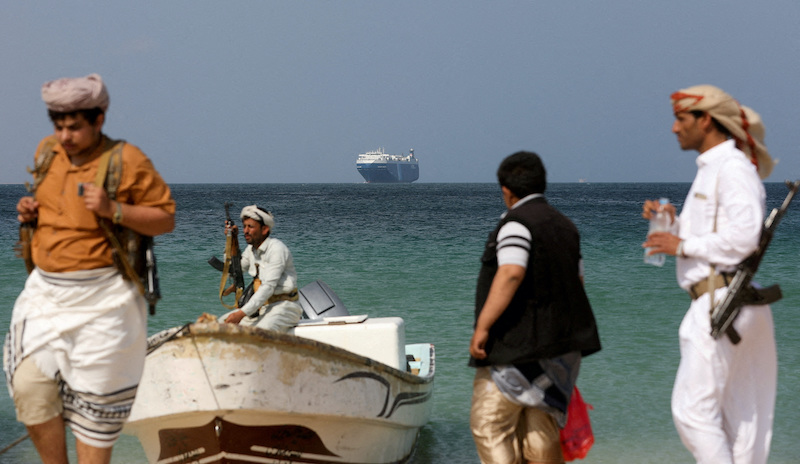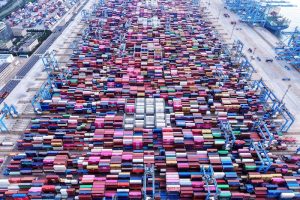Relentless Houthi strikes on shipping vessels in the Red Sea have triggered a steep plunge in freight movement and led China to warn Iran on reining in the attacks.
Since the assault by the Iran-backed group began in December, 39% fewer ships are moving through the key trade route that connects Asia with the West.
That has led to a 45% decline in freight tonnage, a UN agency said on Thursday.
Also on AF: US Frustration at Chinese ‘Inaction’ Over Red Sea Attacks
“We are very concerned,” Jan Hoffmann, the United Nations Conference on Trade and Development’s head of trade logistics, said.
The agency noted that the Red Sea disturbance comes at precarious time for global trade, given Russia’s invasion of Ukraine has already disrupted flows of grain and oils, while a severe drought in the Panama Canal has slashed shipping movement too.
Last month, shipping through the Panama Canal — the world’s most used trade route — was down 36% year-on-year and 62% from two years ago.
That, coupled with shipping companies now being forced to travel along the Cape of Good Hope to avoid the Red Sea, risks fuelling higher inflation and uncertainty of food security, the agency said.
“We are seeing delays, higher costs, higher greenhouse gas emissions,” Hoffmann told a briefing.
Emissions were rising, he said, because ships were opting for longer routes and also travelling faster to compensate for detours.

China worried about its interests
The trade disruption has led Chinese officials to ask their Iranian counterparts to help rein in the Red Sea attacks or risk harming business relations with Beijing, sources said.
The discussions took place at several recent meetings in Beijing and Tehran, Iranian sources said.
Iran is a major backer of Houthi militants who say their attacks are intended to show support for Palestinians in the Gaza War.
Beijing made it clear it would be very disappointed with Tehran if any vessels linked to China were hit, or the country’s interests were affected in any way, the sources said.
Victor Gao, chair professor at the Soochow University in Suzhou said, China, as the world’s biggest trading nation, was disproportionately affected by the shipping disruption and restoring stability in the Red Sea was a priority.
Earlier this month, China’s foreign minister Wang Yi also called for an end to attacks on civilian ships in the Red Sea.
Beijing’s limited influence
China has been Iran’s biggest trading partner for the past decade. Chinese oil refiners bought over 90% of Iran’s crude exports last year, as US sanctions kept many other customers away and Chinese firms profited from heavy discounts.
Analysts Gregory Brew of Eurasia Group and Ali Vaez of the International Crisis Group said China had potential leverage over Iran because of its oil purchases and because Iran was hoping to attract more Chinese direct investment in future.
However, both said China had so far been reluctant to use its leverage, for several reasons.
“China prefers to free-ride on the US safeguarding freedom of navigation in the Red Sea by bloodying the Houthis’ nose,” Vaez said.
He was referring to military strikes by US and British forces on Houthi targets in Yemen this month, that have, so far, failed to stop the attacks.
Beijing was also aware that Iran did not have total control over its Yemeni allies, Vaez added.
Food, fuel prices at risk
Whether or not Tehran heeds Beijing’s warning remains to be seen, but as long as tensions in the Red Sea persist, the threat of rising inflation will shadow the global economy.
The Suez Canal handles 12-15% of global trade and 25-30% of container traffic. Container shipments through the canal were down 82% in the week to Jan 19 from early December.
Meanwhile, for LNG, the decline was even greater. The drop-off for dry bulk was smaller and crude oil tanker traffic was very slightly higher.
Spot container rates recorded their sharpest weekly increase of $500, affecting not just Asia-to-Europe shipments but also the non-Suez route to the US west coast, which has more than doubled. However, rates were still only about half of the peak hit during the Covid-19 pandemic.
UNCTAD’s Hoffmann said food prices could feel the impact of the tensions. About half of the increases seen since the war in Ukraine were due to higher transport costs, he added.
But Hoffmann also noted that end-consumers in developed countries may take some time to see an effect.
“Passing on these higher freight rates to consumers takes time, up to a year until… we would really see them in the shop, whatever shop – Ikea, Walmart or something,” he said.
- Reuters, with additional editing by Vishakha Saxena
Also read:
Red Sea Attacks Pose Billions Worth of Risks for China, India
Chinese Exporters Face Shipping Crisis From Red Sea Attacks
Red Sea Shipping Disruption May Last ‘at Least a Few Months’
Shipping Chaos Set to be ‘New Normal’ Amid War, Climate Change
Shipping Firm to Use Saudi Land Routes to Avoid Red Sea Threat
Red Sea Attacks Spur a Surge in Asia-to-Europe Air Freight
Panama Canal Traffic Cut by Third, Adds to Red Sea Woes – AP
























